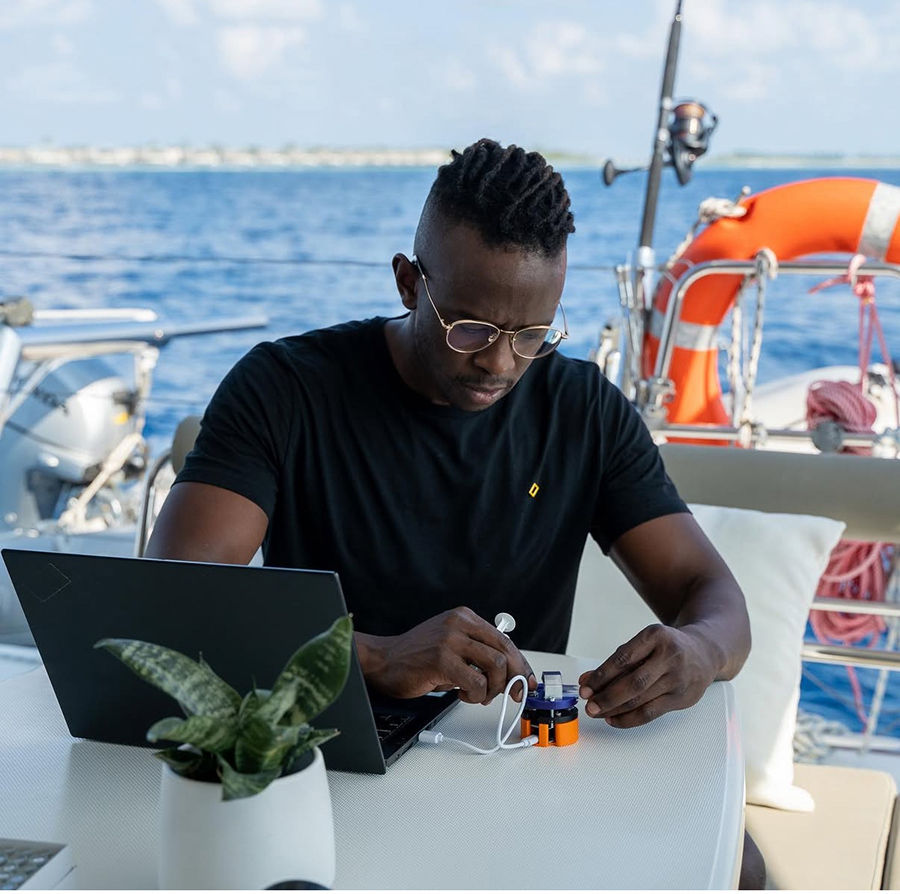Shark Month: Meet Shark Scientist Gibbs Kuguru
- Sharks4Kids

- Jul 12, 2025
- 3 min read
Gibbs Kuguru is a Kenyan shark scientist who studies the DNA of sharks. Gibbs is using his genetic research to understand better the unique elements in DNA that shape the populations of sharks in the blue wilds of the world. As a conservationist, he advocates for the stewardship of nature where people use our planetary resources in a sustainable way that enhances biodiversity in our environment. Kuguru is currently completing his Ph.D. in genomics at Wageningen University, revealing the causes behind a rare skin disorder affecting blacktip reef sharks in the Maldives.
Follow Gibbs on INSTAGRAM
And make sure to catch him on National Geographic's Shark Fest

1. What is your favorite shark and why?
I’d have to say the great white shark! I’ve spent six years with them in South Africa: observing, diving, researching, and every encounter felt different. What’s really hooked me is how individual they are. Some are shy, some bold, and some like to put on a show. They’re powerful, but also curious and full of personality. They remind me that sharks aren’t just ancient apex predators; just like us, they’re complex beings.

2. What is the most incredible shark moment you've had?
That would have to be SCUBA diving in a shoal of tiger sharks in the south of the Maldives. It was unreal! I was surrounded by multiple tigers, all of them big, beautiful, and completely unbothered by my presence. Watching them move around, interact with each other, and then occasionally check me out up close and personal...it felt like I was stepping into another world.

3. What is one thing you wish everyone knew about sharks?
That they’re not just solitary creatures. We’re only now starting to unravel the social lives of sharks, how they form groups, establish hierarchies, and maybe even maintain long-term associations. It could be that they’re more like us than we ever imagined. The idea that they’re mindless killing machines couldn’t be further from the truth.
4. What sparked your interest in studying sharks?
Interestingly, it came from my undergrad supervisor, Prof. Tim Wakefield. I was on the pre-med track and planning to go to medical school, but he saw something in me (maybe my disinterest in medical studies) and nudged me toward sharks. That little push landed me deep in the water with sharks, and I couldn’t be happier.

5. Can you tell us a little about your journey as a scientist?
It’s been wild. After my bachelor’s degree, I flew to South Africa, jumped on a shark research boat, and never looked back. At the time, I wasn’t a diver; I wasn’t even a confident swimmer. I barely knew anything about marine science. But I just kept showing up, one day at a time, one dive at a time. Over the years, I started to realize that I had developed an expertise in it. That’s what I love about science: if you stick with it, there’s space for you to grow.

6. What advice do you have for students interested in pursuing marine biology/shark science?
Don’t wait for permission. Seriously. If you love it, chase it: volunteer, intern, message people whose work you admire. Use your unique skills as much as you can; maybe you’re good at storytelling, data analysis, film, or something else I couldn’t even imagine. There’s room for all of it in conservation. But most of all, follow what makes your heart sing. That’s what will keep you going when it gets hard. Let your talent shine, but let your passion lead.





















